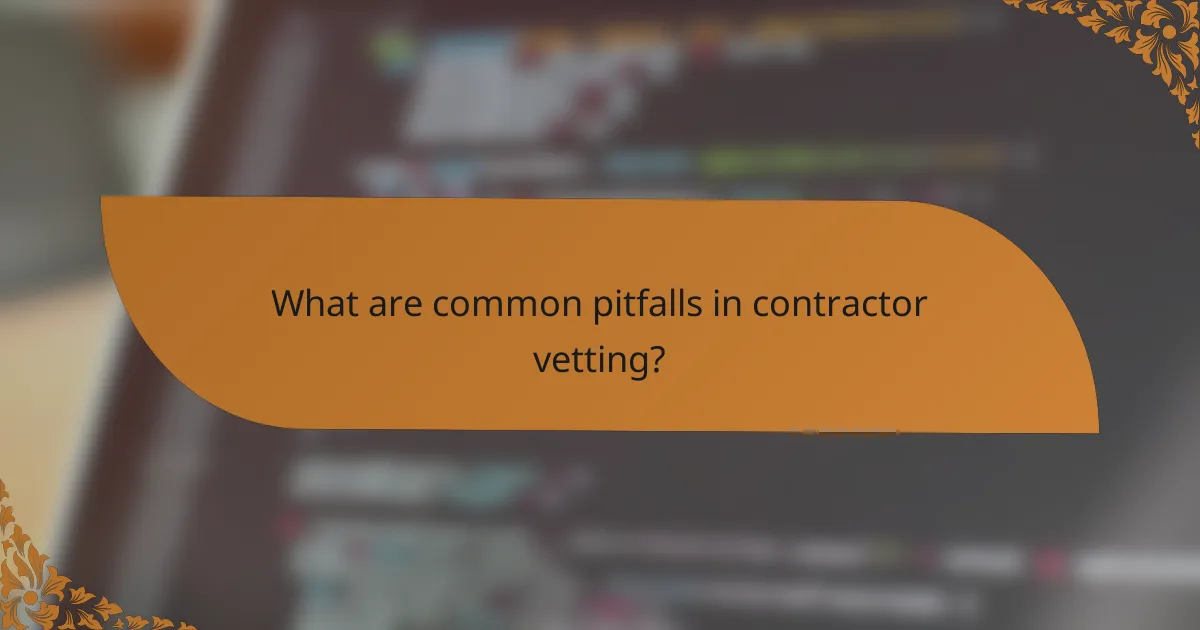Contractor vetting is a crucial process that ensures potential contractors possess the necessary qualifications and standards for a project. This involves defining project requirements, researching candidates, conducting interviews, checking references, and reviewing contracts. By evaluating key criteria such as experience, licensing, and reputation, you can select a qualified contractor who meets your specific needs. Utilizing various tools like online review platforms and contractor management software can further streamline and enhance this vetting process.

What are the steps for contractor vetting?
Contractor vetting involves a systematic process to ensure that potential contractors meet the necessary qualifications and standards for a project. The steps include defining project requirements, researching contractors, conducting interviews, checking references, and reviewing contracts.
Define project requirements
Clearly outlining project requirements is crucial for successful contractor vetting. This includes specifying the scope of work, budget constraints, timelines, and any necessary qualifications or certifications. A well-defined project brief helps to attract suitable candidates and sets clear expectations.
Consider creating a checklist of essential requirements to ensure nothing is overlooked. This could include technical skills, experience level, and compliance with local regulations or industry standards.
Research potential contractors
Researching potential contractors involves gathering information about their experience, reputation, and past projects. Utilize online platforms, industry directories, and social media to find contractors who specialize in your project type. Look for reviews and ratings to gauge their reliability.
Additionally, consider reaching out to local trade associations or chambers of commerce for recommendations. This can provide insights into contractors who are well-regarded in the community.
Conduct interviews
Interviews are a key step in assessing a contractor’s fit for your project. Prepare a set of questions that address their experience, approach to project management, and problem-solving skills. This interaction allows you to evaluate their communication style and professionalism.
During the interview, discuss specific scenarios related to your project to see how they would handle challenges. This can reveal their expertise and help you make an informed decision.
Check references
Checking references is essential to verify a contractor’s past performance. Contact previous clients to inquire about their experiences, focusing on aspects like quality of work, adherence to deadlines, and communication. Ask for specific examples of how the contractor handled challenges during the project.
Consider requesting references from projects similar to yours, as this will provide a clearer picture of their capabilities in relevant contexts.
Review contracts
Thoroughly reviewing contracts is vital before finalizing any agreement with a contractor. Ensure that all project details, including scope, timelines, payment terms, and warranties, are clearly outlined. Pay attention to clauses related to changes in scope or unforeseen circumstances.
It may be beneficial to consult a legal professional to ensure that the contract protects your interests and complies with local laws. This step can prevent misunderstandings and disputes later on.

What criteria should be used for contractor selection?
Key criteria for contractor selection include experience, licensing, reputation, and cost. Evaluating these factors helps ensure that you choose a qualified contractor who can meet your project needs effectively.
Experience and expertise
Assessing a contractor’s experience and expertise is crucial. Look for contractors who have a proven track record in your specific type of project, whether it’s residential, commercial, or specialized work. A contractor with several years of relevant experience is more likely to navigate challenges effectively.
Consider asking for examples of past projects, including references or case studies. This will give you insight into their capabilities and the quality of their work.
Licensing and insurance
Ensure that the contractor holds the necessary licenses and insurance required by local regulations. A valid license demonstrates that the contractor meets industry standards and is legally authorized to perform the work.
Insurance is equally important; it protects you from liability in case of accidents or damages during the project. Request proof of insurance and verify that it covers both general liability and workers’ compensation.
Reputation and reviews
Researching a contractor’s reputation is essential for making an informed decision. Look for online reviews, testimonials, and ratings on platforms like Google, Yelp, or specialized contractor review sites.
Additionally, ask for references from previous clients. Speaking directly with past customers can provide valuable insights into the contractor’s reliability, communication, and overall satisfaction with the work performed.
Cost estimates
Obtaining detailed cost estimates from multiple contractors allows for effective comparison. Ensure that estimates include a breakdown of labor, materials, and any additional fees. This transparency helps avoid unexpected costs later on.
Be cautious of estimates that are significantly lower than others; they may indicate subpar quality or hidden costs. Aim for a balance between cost and quality, and consider the overall value rather than just the lowest price.

What tools can assist in contractor vetting?
Various tools can enhance the contractor vetting process, making it more efficient and reliable. These tools include online review platforms, contractor management software, and background check services, each serving a distinct purpose in evaluating potential contractors.
Online review platforms
Online review platforms aggregate feedback from previous clients about contractors, providing insights into their performance and reliability. Websites like Yelp, Angie’s List, and Google Reviews allow users to read experiences and ratings, which can help in making informed decisions.
When using these platforms, look for patterns in reviews rather than focusing solely on individual comments. A contractor with consistently high ratings is likely to be a safer choice than one with mixed feedback. Be cautious of overly positive reviews, as they may be fabricated.
Contractor management software
Contractor management software streamlines the vetting process by centralizing contractor information, documentation, and compliance checks. Tools like Procore, Buildertrend, and CoConstruct help manage contracts, track project progress, and ensure that contractors meet necessary regulations.
When selecting contractor management software, consider features such as user-friendliness, integration capabilities with other tools, and customer support. This software can save time and reduce errors, but ensure it fits your specific project needs.
Background check services
Background check services provide detailed reports on contractors, including criminal history, financial stability, and work history. Companies like GoodHire and Checkr offer comprehensive checks that can reveal potential red flags.
It’s essential to choose a background check service that complies with local regulations, such as the Fair Credit Reporting Act (FCRA) in the United States. Always obtain consent from the contractor before conducting a background check, and be prepared to discuss any findings with them transparently.

How to evaluate contractor bids effectively?
To evaluate contractor bids effectively, focus on comparing costs, assessing value, and reviewing timelines. This process ensures you select a contractor who meets your project needs while staying within budget.
Compare line-item costs
Start by breaking down each bid into line-item costs to understand what you are paying for. Look for detailed descriptions of materials, labor, and overhead to identify any hidden fees. This transparency allows for a direct comparison between bids.
For example, if one contractor lists high-quality materials while another opts for cheaper alternatives, the cost difference may reflect the long-term value of the project. Aim for clarity in each line item to avoid surprises later.
Assess value versus price
Evaluating value involves looking beyond the initial price tag. Consider the quality of work, the contractor’s reputation, and any warranties or guarantees offered. A higher bid may be justified if it includes superior materials or exceptional service.
For instance, a contractor with a proven track record of on-time project completion and positive reviews may provide better value, even if their bid is slightly higher. Weigh these factors against your budget constraints to make an informed decision.
Review timelines and deliverables
Timelines and deliverables are crucial in contractor bids. Ensure that each bid outlines a clear schedule for project milestones and completion dates. This helps you gauge whether the contractor can meet your deadlines.
Ask about potential delays and how they plan to mitigate them. A contractor who provides a realistic timeline with contingencies shows professionalism and reliability. Compare these timelines across bids to find the best fit for your project schedule.

What are common pitfalls in contractor vetting?
Common pitfalls in contractor vetting include ignoring warning signs and overlooking important contract details. These mistakes can lead to costly delays, subpar work, and potential legal issues.
Ignoring red flags
Ignoring red flags during contractor vetting can result in hiring unsuitable candidates. Look for signs such as poor communication, lack of references, or incomplete documentation. These indicators often suggest that a contractor may not meet your project’s standards.
To avoid this pitfall, establish a checklist of red flags to monitor. For instance, if a contractor has a history of missed deadlines or unresolved complaints, consider these as serious concerns. Trust your instincts; if something feels off, investigate further.
Overlooking contract details
Overlooking contract details can lead to misunderstandings and disputes later in the project. Ensure that all aspects of the agreement, including payment terms, timelines, and scope of work, are clearly defined. Vague contracts can create confusion and lead to costly overruns.
To mitigate this risk, review the contract thoroughly before signing. Pay attention to clauses related to penalties for non-compliance or changes in project scope. It’s advisable to consult with a legal expert if you’re unsure about any terms to ensure your interests are protected.
